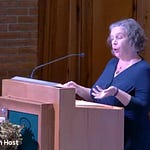I am not a biblical scholar. I admire people who can use the Bible to counter arguments from those professing to be Christian who say all LGBTQ+ people are going to hell. That’s not my lane. I don’t even believe in hell, so I’d have a hard time debating it anyway.
My lane is Love.
I talk about the expansiveness of Love. About how we can only see in part and therefore can’t know with certainty whether we’re right about our spiritual beliefs. And if we can’t know we’re right, then why not live in a way that grows more love – for ourselves, for others, and for the Divine?
There’s no real label for what I believe. Nor do the labels we use make much sense. What does the word Christian even mean? You’d think it means following the words and example of Jesus, wouldn’t you?
Yet, some who call themselves Christian don’t seem to be following much of what Jesus said and did. Not my lane to argue that point – many wise, faithful people have tried. But it seems futile. Like screaming into the wind. The faith doesn’t seem to matter to them — the label Christian does.
Let me give you an example. Recently, I came across a post from a parent who had lost their LGBTQ+ teen. It was just a simple remembrance – a photo, a few aching words. And strangers descended. Not with comfort or compassion. But with condemnation, quoting scripture and declaring judgment on the teen and the parent as if grief were a battleground and love had no place there.
It stopped me cold – not only for the cruelty of it, but for the hollowness underneath. These weren’t people who knew this parent, who had ever sat beside them in the messy intimacy of real life. They were just names on a screen, typing words without tone or tenderness, clutching the label Christian as if it were armor, shielding them from any repercussions of their words.
You know – “speaking the truth with love.” Because in certain corners of the Christian ecosystem, correcting others is seen as an expression of love.
But is that love?
Most of us probably know the words from 1 Corinthians 13. Love is patient and kind. It is not jealous or boastful. It is not arrogant or rude. Love bears all things, believes all things, hopes all things, endures all things. Love never dies.
That’s the standard — the one many Christians say they follow.
So if our words aren’t patient… if they’re not kind… if they cut rather than comfort…
Can we really call them love?
Online, words float free of the human beings who speak them. There’s no tone of voice to soften their edges, no facial expression to reveal second thoughts, and no shared history to hold them accountable.
And the word Christian is especially fraught. “Christian” most likely means something entirely different to each person who claims it. That’s why everyone seems so busy declaring who’s using it “wrong.”
Why can’t we just admit that there is no universal definition? I can already hear the protests – “But MY definition is the correct one!”
This is where the “keyboard warrior” emerges: brave behind the screen, armed with certainty, convinced they are loving because they are correcting others in the name of religion.
In the name of Love.
But love is patient … and nothing about this is patient. Love is kind… and nothing about this is kind.
Certainty is brittle. It shatters the moment it has to sit face-to-face with another person’s grief, their complexity, and their humanity. It shatters when we allow humility to enter our hearts.
When faith is only words, it can’t hold the weight of real life.
People invoke the label Christian as if it were proof of goodness — a credential rather than a calling. That’s called virtue signaling – public displays of righteousness meant to secure approval. It’s faith as a badge, not a practice.
The internet makes it so easy. There’s no eye contact, no shared community, no long history of love to hold our words accountable. Without that web of relationship, even sacred language can become hollow — and hollow things echo loudest.
And perhaps the most dangerous echo is this: mistaking correction for compassion.
Calling it love when it is really control.
Because real love doesn’t arrive as judgment. It arrives as presence.
Real love doesn’t set out to prove someone wrong. It doesn’t lecture. It transforms.
It draws close. It listens. It honors the sacredness of another soul.
Faith is about transforming the heart. Living faith has weight to it. It roots itself in flesh and bone and daily practice. It doesn’t hover above real life; it steps into it.
The fruits of performative faith are pride, division, and cruelty.
The fruits of embodied faith are love, humility, and mercy.
Embodied faith doesn’t ask, How do I appear?
It asks, Who needs love, and how can I offer it?
If love is patient and kind, then it must also be rooted — in our hearts, in our relationships, and in our daily lives. That’s why I remind people that Love is three-fold: love of self, love of others, and love of the Infinite Mystery beyond our understanding – the Source of Love itself.
These three are braided together. They rise and fall together. If you love yourself, but don’t love your neighbor, your love can only grow so far. But if you love yourself and you love your neighbor, the love magnifies. It expands exponentially.
Love grows when we move beyond words into relationship — with our own hearts, with the needs and fears of those around us, and with that which is Transcendent.
That parent who posted about their child will likely never know the names of the people who lashed out at them. But those words still cut. Disembodied words can wound as deeply as any blade.
We can’t force others to live their professed values. Nor can we see into someone else’s heart.
We can only look into our own.
We can refuse to let our own faith become hollow. We can choose to make love more than a label.
Love is not something we wear – it’s the way we should move through the world.
Joni Miller, Ph.D., is a writer, researcher, spiritual coach, and speaker who uses her knowledge, education, and love of all things spiritual to help spiritual wanderers find a place they can call home, navigating by the light of Love. www.SpiritualGeography.net
Very basic graphic by the author












